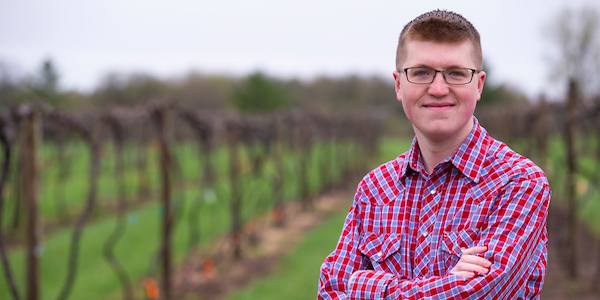
Intern Renews Landscape Scorched by Wildfire
The hills were blackened. What was once a house, now a cement slab.
Wildfires brought destruction to the lush hillside vineyards, rangelands and forests of Napa County, California, in the fall of 2017. Six months later, Jacob Wright, a junior in agronomy, found himself in the midst of a Natural Resources Conservation Service (NRCS) team dedicated to the recovery of the landscape.
“Often people just didn’t know where to start,” says Wright. “We would visit the property and point them in the right direction. We worked together with multiple agencies at both the state and federal level.”
When looking for an internship, Wright was particularly interested in working with soil and had his sights set on the NRCS. He hoped to expand his perspectives beyond the dairy farm in Virginia where he grew up and the row crop systems of the Midwest. He applied for a NRCS Pathways Program internship in soil conservation which could place him anywhere across the country from New Hampshire to Hawaii.
His first offer came from Nebraska, but he was really hoping to experience something completely different than the corn and soybean production he was now familiar with at Iowa State. Then came the offer from California. He was thrilled.
“We did some work with vineyards,” says Wright. “Cover crop plans and replacing burned irrigation systems, but probably 80 percent of our work was in forests. They have programs for forested ground just like the Conservation Reserve Program in the Midwest.”
Navigating the federal systems, policies and procedures to get landowners moving toward recovery was a tremendous learning experience for Wright.
“As his supervisor, I was pleased with Jacob’s curiosity and genuine interest to learn,” says Emma Chow, NRCS district conservationist. “I was better able to tailor his workload because he expressed interests and was open to new experiences.”
The Napa County NRCS team exposed Wright to as much as possible in a relatively short amount of time. NRCS and partner positions in the office gave Wright insight into the bigger picture as well as the day-to-day work. He was able to spend a day assisting Major Land Resource Area soil scientists with soil characterization and lab sampling. And, neighboring county offices offered Wright unique perspectives with rangeland and pasture management.
“It’s incredible how just one county away agriculture can be so different,” Wright says. “I was so fortunate to gain exposure to so much in such a short time.”
Wright credits his experience to advisers and mentors in agronomy. His adviser agronomy professor Lee Burras (’81 agronomy, ’84 MS soil science) guided Wright to classes in soil science. Lecturer Amber Anderson put him in touch with alumni who helped him navigate federal application systems.
“Jacob asks good questions and builds on everyone’s insight,” Burras says. “He is incredibly motivated and sees long-term. He had a goal to work for NRCS and went after it.”
Wright is involved in the soil judging team and has served as the Soil and Water Conservation Club vice president and publication editor. He is active with the College of Agriculture and Life Sciences Student Council, Agronomy Club and the Iowa Corn Growers Collegiate Club.
He is one of 55 students from across the United States selected for a prestigious Udall Scholarship – chosen based on leadership, public service and commitment to issues related to the environment or Native American nations.
“Jacob’s passion for environmental issues and soil science is matched by his incredible communication skills,” Anderson says. “As my teaching assistant, he works with fellow students from differing backgrounds and has an innate ability to reach them in a meaningful way.”
Wright first spoke with representatives from NRCS at the College of Agriculture and Life Sciences Career Fair, the largest of its kind in the nation.
“My friends at school back home in Virginia were astounded I had an internship as a junior,” he says. “That’s part of why I chose Iowa State. The curriculum in agronomy required an internship.”
Wright’s experience at Iowa State also includes field and lab work with the National Laboratory of Agriculture and the Environment as well as soil data work within the agronomy department.
Now he can add wine-making to the list as well. While not the focus of his official internship, he lived with a wine maker for the summer, and that informal experience offered tremendous knowledge as well.
“My second day in California I was bottling pinot noir,” Wright says. “I rarely turn down an opportunity to learn something. When they asked if I wanted to help I was all in.”
As part of the Pathways Program, he’ll spend another summer in California, this time in the central part of the state, in Fresno, working for the NRCS. And, he’ll have a full-time job opportunity waiting for him after he graduates in May 2020.



